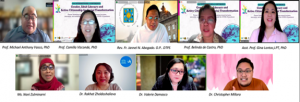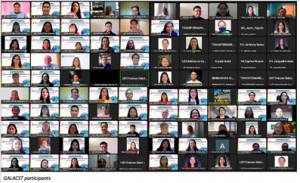The UST Graduate School, together with the Research Center for Social Sciences and Education (RCSSEd), and Transformare: A network of adult literacy and lifelong learning advocates, in collaboration with the UNESCO Chair in Adult Literacy and Learning for Social Transformation at the University of East Anglia, UK brought to the fore the second international conference on Gender, Adult Literacy, and Active Citizenship for Social Transformation (GALACST). This year’s theme was “Bolstering inter-generational linkages towards inclusive, innovative and sustainable communities amidst the Covid19 pandemic.”

This online event was held via Zoom on March 25-26, 2022. The participants were welcomed by Rev. Fr. Jannel N. Abogado. O.P.. DTPS, the Acting Vice-Rector for Research and Innovation. This was followed by the opening remarks given by Prof. Michael Anthony Vasco, PhD, the Dean of the Graduate School. The Keynote Speech which was on the topic of Lifelong Learning and Education for Equality and Justice was delivered by Ms. Nani Zulminarni, the President of the Asia-South Pacific Association for Basic and Adult Education(ASPBAE) and the Founder of Perempuan Kepala Keluarga (PEKKA) or Women Headed Family Empowerment. What followed afterwards was the Launching of the Family Literacy and Intergenerational Learning Certificate Course where Asst. Prof. Gina Lontoc, PhD, the Country Project Lead of the UST Family Literacy Projects, presented the rationale of the program and introduced the mentors and scholars.
Three plenary sessions took place during the event. The first one was on the topic of ‘Unlocking the potential of Family and Intergenerational Learning” by Dr. Rakhat Zholdoshalieva, the Team Leader of Policy Support and Capacity Development in Lifelong Learning, UNESCO Institute for Lifelong Learning in Hamburg. Another plenary talk was by Dr. Valerie Damasco, Researcher/Project Director from the Ontario Institute for Studies in Education (OISE), the University of Ontario, Canada. Her topic examines the changing structure of transnational families and literacy initiatives implications for equity and inclusion intergenerational learning, health, and community participation”. The third plenary session which was focused on the theme, “Learning in/through social action: Literacies, knowledges and active citizenship” was shared by Dr. Christopher Millora. He currently acts as the Chair of British Association for Literacy in Development (BALID), United Kingdom.

Quickfire sessions were also held on each day of the conference. These sessions involved the UST Simbahayan Community Development Office and other partners who shared their best practices in terms of health, livelihood, culture, and various forms of learning amidst the COVID19 pandemic.
World Café sessions were also held where a discussion on topics like “Exploring the Roles of Local and Indigenous Knowledge Systems in Promoting Learning” was led by the Family Literacy Teams of the UNESCO Chair partner institutions such as the Bahir Dar University, Ethiopia and the University of Santo Tomas, Philippines. The results of a collaborative research, “COVID-19 and its impact on Adult Learning and Education: a scoping research in the UK, Afghanistan and the Philippines”, between the British Association for Literacy in Development and Transformare was the focus during the second World Cafe session.
Another highlight of the conference was the Networking Hubs which were Zoom breakout rooms that were created according to themes such as environmental and economic sustainability, family literacy and intergenerational learning, gender and development, health literacies, indigenous learning, inclusive education, and sustainable livelihoods. This gave the participants opportunities to meet people who share similar fields of interest; thus, expanding their networks.
The conference was ended by the closing remarks by Prof. Belinda de Castro, PhD, the Director of the UST Research Center for Social Sciences and Education(RCSSEd).




